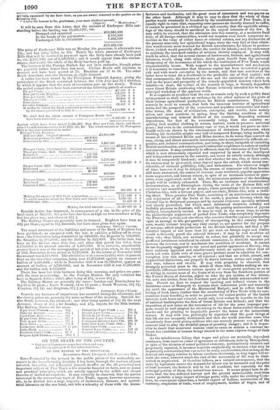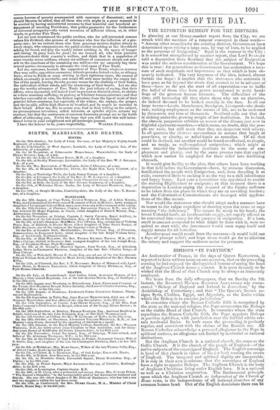ON THE STATE OF THE COUNTRY.
•• Unfettered Commerce reaps her wines and corn, And Plenty springs with her redundant
TO THE EDITOR OP TILE SPECTATOR.
Roscommon Street, Liverpool, 11th NGvember 1841.
SIR—Prompted by the perusal in the public prints of the melancholy ac- counts in the manufacturing districts, I beg leave, through the medium of your talented, impartial, and influential journal, to offer on the all-pervading and important subject of Free Trade a few remarks founded on facts, and on sound and practical principles, which are utterly opposed to the selfish and absurd theories of landed monopolists. It may correctly be observed, that the parties interested in the momentous topic of Free Trade, appear, however unnecessa- rily, to be divided into a large majority of landowners, farmers, and agricul- tural labourers on the one band, and into a minority of these with the manu- facturers and mechanics, and the great mass of consumers and tax-payers on the other hand. Although it may be easy to show that the whole of these parties would eventually be benefited by the establishment of Free Trade, it is equally right to state that, supposing some persons are thereby doomed to ;rifler, it cannot be permitted in a civilized age and country that the equitable advan- tage of the many should be sacrificed to the unjust interests of the few. It may safely be averred, that the admission into this country, at a moderate fixed duty, of all foreign commodities, would not occasion even much temporary re- duction in the value of either home or colonial estates, nor any diminution of the present miserably low agricultural wages, since the very fact of that admis- sion would create more demand for British manufactures, for labour to produce them, (which would generally affect the market for labour,) and for sustenance to maintain the increased number of artisans thereby employed. It may with truth be added, that the several classes of landowners, farmers, and agricultural labourers, would, along with others, derive great benefit from the universal cheapening of the necessaries of life which the institution of Free Trade would unquestionably insure. With respect to the manufacturers and mechanics, it is necessary to remember that immense capital has been invested at a great risk and with much enterprise by the former, and that vast numbers of the latter have to trust for a livelihood to the profitable use of that capital; and that consequently, the fortunes of the one and the existence of the other, as well as the peace and prosperity of the densely-populated districts which both inhabit—in short, the welfare of the country at large, is literally dependent upon Great Britain continuing what Nature evidently intended her to be, the principal workshop of the spacious world. It is requisite to recollect that she can so remain only by such a politic fiscal arrangement as shall induce an exchange by the other nations of the globe of their various agricultural productions for British manufactures. There can scarcely be need to remark, that both the immense increase of agricultural rents, and the prosperity of the numerous and populous commercial and mari- time towns, the seats of civilization, enterprise, and wealth, have mainly arisen and must continue to spring, from the thriving condition of the manufacturing and mineral districts of the country. Regarding national dependence, the fact of its necessarily being, from one country re- quiring food another clothing in return, mutual, tends to preserve universal peace; but even in the extraordinary case of war, it would not prove an into- lerable evil,—as shown by the circumstance of victorious NAPOLEON, when wielding his invincible sceptre over half of conquered Europe, being unable, by means of his celebrated Berlin and Milan decrees, to do worse than convert an easy, cheap, and direct mercantile intercourse, into a comparatively difficult, ex- pensive, and indirect communication, and being, in short, incapable of excluding British merchandise, and reducing our Continental neighbours to a state of nudity and starvation. It may confidently be affirmed, that the vital cause of Free Trade, which is now strenuously espoused and supported by most of the intelligent and independent persons in the country, can never be utterly ruined, although it may be temporarily hindered ; and that whether for one, two, or three years, its success may be prevented, must depend upon the extent, which seems con- siderable, of national gullibility, folly, and forbearance. For whatever length of time, however it may be delayed, the stream of commerce will then become still more abstracted, the source of revenue more restricted, popular oppression more augmented, and human misery, in spite of an increased burden of poor- rates, more aggravated, until at last the miraculous patience of the famishing people will be entirely exhausted. Then, Sir, an immense and constitutional demonstration, as at Birmingham during the crisis of the Reform Bill, will occur—a vast assemblage of the people, whose proceedings will be commenced, Christian-like, with a fervent prayer, and conclude, Briton-like, with a thrill- ing cheer. Then genuine Free Trade, consisting of an unfettered interchange and enjoyment of all the fruits of the earth, a precious blessing which the Creator has in Scriptural passages and by natural evidences specially ordained and clearly prescribed, but which some infatuated creatures seltiehly and foolishly presume to frustrate, will be, amid the pealing acclamations of joyous millions, triumphantly carried. It may be well, in the mean time, to advise the philanthropic supporters of perfect Free Trade, who completely deprecate the Protective system, and also those who consider that the expense (amounting upon an average to 10s. per quarter) of transporting to this country foreign corn, would, without levying any duty except Is. per quarter for the purpose of revenue, afford ample protection to the British landowner, and that a dif- ferential impost of not more than 25 per cent. on foreign sugar and timber would sufficiently guard the colonial interest ; it may be well to advise- all those who thus think, not unwisely to refuse, but gratefully to accept any proffered instalment calculated to extend commerce, to diminish taxation yet increase the revenue, and to ameliorate the condition of mankind. It cannot be too frequently suggested to the novel and partial opponents of Slavery, who have suddenly appeared and mischievously acted, an opinion either that all sorts, not some kinds only of slave grown produce must be admitted for con- sumption into this country, or all rejected; and that no selfish, absurd, and hypocritical distinction, can properly be drawn between cotton and sugar, rice and rum, tobacco and treacle. It may with propriety be observed, that strangely perverted must be the minds of those who, besides making an un- justifiable difference between various species of slave-grown produce, so as to be willing to receive most of the fruits of slavery from the Southern portion of the United States of America, object to take the pro actions of free labour, viz. corn and timber, from the Northern part of that fertile and extended terri- tory. Permit we here to request the exulting and inflated victors in the disastrous cause of Monopoly to restrain their indecorous pride and unseemly joy until the appearance of the Ministerial Budget ; and to reflect that the raising of fresh loans, (rather than the sanctioning of Free Trade with its con- comitant fiscal benefits,) in order to preserve the unjust profits of the landed interest, both home and colonial, would only tend sooner to inscribe in the list of national bankruptcies the firm of Great Britain and Ireland; and that the imposition of new taxes on the necessaries of life for the same improper pur- pose, would he well adapted for stretching to the finest India-rubber thread the sinews and for grinding to impalpable powder the bones of the industrious masses. It may with true philosophy be regretted that the good things of this life are too unequally distributed, and that the world contains some who luxuriously feast amid pining millions who can scarcely procure enough of the coarsest food to allay the dreadful pangs of gnawing hunger; and it is impos- sible to doubt that unnatural reasons exist to cause so serious a contrast be- tween the condition of human beings formed in the same express image of their Maker.
As the mischievous fallacy that wages and prices are mutually dependent continues, from motives either of ignorance or sellishuess, to be by Monopolists, in spite of the dictates of sound political economy, pertinaciously retained and perpetually repeated, it becomes requisite emphatically to declare, what may be impudently contradicted but can never be really controverted, that as lung as the demand and supply relative to labour continue stationary, so long wages will re- main the same, however much the cost of the necessaries of life may be dimi- nished or augmented. It therefore follows, as a natural consequence, that the more by legitimate means the demand for labour can be increased and the price of food lessened, the better it will be for all mankind, but especially for the principal portion of them, the industrious masses. It seems proper here to ob- serve, that the late deficient harvest and the present unfavourable seed-time render probable a large import of foreign grain, with, under the existing Corn- laws, its consequent calamities, a further export of bullion, contraction of the currency, stagnation of trade, want of employment, decline of wages, and of
course horrors of poverty accompanied with murmurs of discontent; and it ahould likewise be added, that all these dire evils might in a great measure be be averted by having unrestricted recourse to that beautiful and beneficial ar- rangement of unerring Providence, that golden guarantee for the furtherance of universal prosperity—the varied resources of different climes, or, in other words, to genuine Free Trade. Let me now recommend the public creditor, who for self-interested reasons values his dividend, also persona of substance who fear the infliction of a pro- perty-tax; let me entreat those who from generous motives deplore misery in every shape, who compassionate the pallid mother trembling at the threshhold asking for bread, and pity the weakly infant writhing in the agony of hunger and raising its puny voice for pod; let me beseech all, who from patriotic sentiments desire their country's welfare, and think that in a population of some twenty-seven millions, twenty-six millions of consumers should not sub- mit to the exactions of the remaining one million—let me earnestly beg these several parties strenuously to advocate the vital cause of Free Trade. Let me, moreover, beseech the supporters of Free Trade, whatever reverses they may suffer, opposition encounter, ridicule provoke, hatred excite, or obloquy incur, never to flinch or cease striving in their righteous cause, the success of which eventually is inevitable, and would fill with more facility the empty bel- lies of the people, leaving thereby greater means for the clothing of their bodies, the cultivation of their minds, and the chastening of their hearts. Let me also pay the worthy advocates of Free Trade the just tribute of saying, that their efforts, when successful, will indeed tend to prevent or diminish crime, to obviate or relieve mundane suffering, to prolong or felicitate human existence; and that whether successful or vain, the holiest aspirations from the lips of most of their grateful fellow-creatures, but especially of the widow, the orphan, the pauper, and the invalid, will to high Heaven be breathed, and by angels be recorded in their behalf. Allow me, Sir, to assure you, that in thus writing on the subject, no presumptuous intentions, selfish interests, or spiteful objects actuate my conduct, but that the sentiments of common humanity prompt me to the feeble effort of addressing you. Under the hope that you will insert this well-inten- tioned letter in your enlightened and philanthropic journal. I have the honour to be, yours respectfully, WALTER FLETCHER.



























 Previous page
Previous page